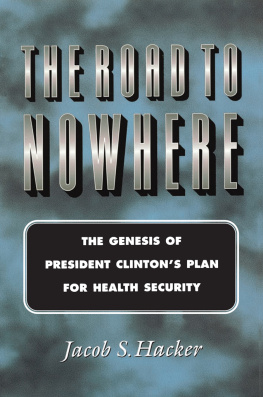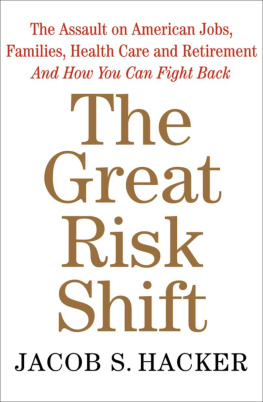THE ROAD TO NOWHERE
PRINCETON STUDIES IN AMERICAN POLITICS: HISTORICAL, INTERNATIONAL, AND COMPARATIVE PERSPECTIVES
IRA KATZNELSON, MARTIN SHEFTER, THEDA SKOCPOL, EDS.
Labor Visions and State Power: The Origins of Business Unionism in the United States by Victoria C. Hattam
The Lincoln Persuasion: Remaking American Liberalism by J. David Greenstone
Politics and Industrialization: Early Railroads in the United States and Prussia by Colleen A. Dunlavy
Political Parties and the State: The American Historical Experience by Martin Shefter
Prisoners of Myth: The Leadership of the Tennessee Valley Authority, 19331990 by Erwin C. Hargrove
Bound by Our Constitution: Women, Workers, and the Minimum Wage by Vivien Hart
Experts and Politicians: Reform Challenges to Machine Politics in New York, Cleveland, and Chicago by Kenneth Finegold
Social Policy in the United States: Future Possibilities in Historical Perspective by Theda Skocpol
Political Organizations by James Q. Wilson
Facing Up to the American Dream: Race, Class and the Soul of the Nation by Jennifer L. Hochschild
Classifying by Race edited by Paul E. Peterson
From the Outside In: World War II and the American State by Bartholomew H. Sparrow
Kindred Strangers: The Uneasy Relationship between Politics and Business in America by David Vogel
Why Movements Succeed or Fail: Opportunity, Culture, and the Struggle for Woman Suffrage by Lee Ann Banaszak
The Power of Separation: American Constitutionalism and the Myth of the Legislative Veto by Jessica Korn
Losing Control: Party Decline in the Fiscal State by John J. Coleman
The Origins of the Urban Crisis: Race and Inequality in Postwar Detroit by Thomas J. Sugrue
The Road to Nowhere: The Genesis of President Clintons Plan for Health Security by Jacob S. Hacker
THE ROAD TO NOWHERE
THE GENESIS OF PRESIDENT CLINTONS
PLAN FOR HEALTH SECURITY
Jacob S. Hacker
PRINCETON UNIVERSITY PRESS PRINCETON, NEW JERSEY
Copyright 1997 by Princeton University Press
Published by Princeton University Press, 41 William Street,
Princeton, New Jersey 08540
In the United Kingdom: Princeton University Press,
Chichester, West Sussex
All Rights Reserved.
Library of Congress Cataloging-in-Publication Data
Hacker, Jacob S.
The road to nowhere : the genesis of President Clintons
plan for health security / Jacob S. Hacker,
p. cm. (Princeton studies in American politics)
Includes index.
ISBN: 0-691-04423-6 (alk. paper)
1. Health care reformUnited States.
2. Managed care plans (medical care)United States.
3. United StatesPolitics and government1993
I. Title. II. Series.
RA395.A3H33 1996
362.10973dc20 96-8083
ISBN-13: 978-0-691-00528-7 (pbk.)
ISBN-10: 0-691-00528-1 (pbk.)
eISBN: 978-0-69122-119-9 (ebook)
R0
To the Memory of Walter, Richard, and Sarah
Preface
THE DEFEAT of President Bill Clintons proposal for comprehensive health care reform stands out as one of the most dramatic reversals of political fortune since President Woodrow Wilsons ill-fated campaign on behalf of the League of Nations. Already, a horde of journalists and political scientists are scrambling through the historical rubble to understand why a presidential initiative with such apparent promise foundered so quickly and so completely. Although the failure of the presidents reform proposal is one of the subjects of this book, the questions I address are broader and more basicnot why President Clintons attempt to reform American medical care failed, but why he made that attempt in the first place and why it took the direction that it did. In particular, I examine how and why President Clinton came to champion the specific collection of policy ideas that was contained in the health care reform proposal he presented to Congress in 1993. This collection of ideasa mixture of regulated competition and budgetary controls that I term the liberal synthesisburst into the political spotlight during the 1992 presidential campaign and quickly became the subject of heated, if not particularly enlightening, debate. Understanding where these ideas came from, how they made their way into the Clinton campaign, and why Clinton embraced them is critical to understanding the political assumptions undergirding the presidents reform effort and why they proved so disastrously wrong.
This book began as an attempt to explain a puzzling change in the terms of the health care reform debate that I observed during the 1992 presidential race. In early 1992, politicians and political commentators talked about national health care reform, but there was a sense that the prospects for reform remained uncertain and that the real debate was still years off. The reform plans that were being discussed most frequently indeed, the only ones that seem to have been considered credible at the timewere the various employment-based plans grouped under the rubric of play-or-pay and supported by the Democratic leadership in both houses of Congress; the more far-reaching single-payer proposals for full-fledged, Canadian-style national health insurance; and the relatively incremental tax-credit plans supported by the Bush administration and congressional Republicans. By the end of the summer, however, as the likely outcome of the 1992 presidential election came into view, the terms of discourse shifted. Increasingly, the question among congressional Democrats was not whether reform would pass but when. More significant still, another approach to health care reform began receiving
I had thought the reasons for this shift would become clearer with the passage of time. In many ways, however, the puzzle only grew deeper. Most health policy specialists and political scientists, whatever their personal views about the political or technical feasibility of managed competition, seemed to accept the turn toward managed competition uncritically. They discussed the outstanding questions surrounding the approach and whether it had a better chance than other reform designs of being enacted. But surprisingly few explained why managed competition was suddenly the favored reform alternative, and if they did, they generally linked its emergence either to Clintons election or to some random fluctuation in the political environment. I began to wonder if the rise of managed competition was really so self-evident or unfathomable. True, Clinton had endorsed the approach during the presidential campaign. But why had he chosen a reform alternative on the periphery of the national debate? Although there was clearly an important element of randomness governing the choice of alternatives for debate, a deeper process seemed to be at work as well. Moreover, I noticed that when politicians and policy experts spoke about managed competition, they were not all talking about the same thing. Deep disagreement about the meaning of managed competition lay just beneath the surface. What were the sources of this disagreement, and what would its consequences be?
To answer these questions, I began to delve more deeply into the scholarship on the making of American public policy. I soon discovered that many of my queries about this particular episode in American politics intersected with the concerns of a broader literature in political science. Although the body of research remains small, numerous political scientists have attempted to understand the process by which problems and policy proposals to address them become the subject of government consideration. Students of public affairs have long had a name for this processagenda settingbut for many years they lacked a comprehensive theoretical framework for studying it. Then, in 1984, John Kingdon revitalized agenda-setting theory with a pathbreaking study based on extensive Both works developed novel indicators of the government agenda. Both offered broad generalizations about the process of agenda setting and the actors involved. And both explained how interactions among political leaders seeking public support, interest groups demanding favorable policy regimes, and strategic entrepreneurs hoping to incorporate their ideas into public policy can lead to the rapid redefinition of policy issues or the sudden emergence of new problems or proposals.









